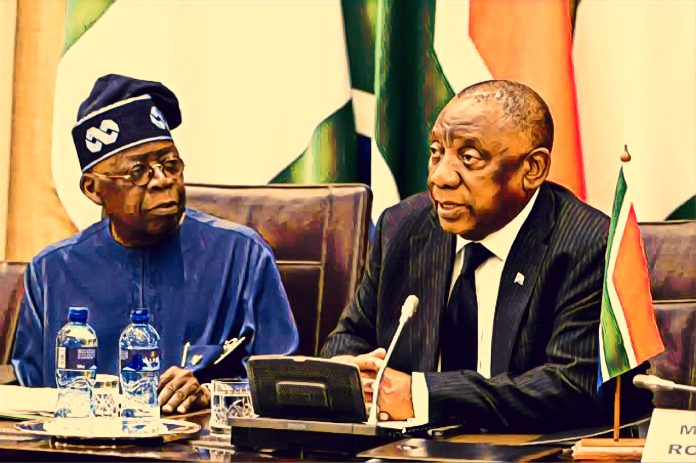KEY POINTS
- South Africa supports Nigeria’s bid to join the G20 for stronger African representation in global economic policies.
- Collaboration on lithium mining aims to drive EV battery production and green energy transition.
- Joint Trade Council operationalized to enhance trade, resolve investment challenges and diversify economic ties.
South Africa has expressed interest in Nigeria’s vast lithium reserves as part of its strategy to drive a green energy transition and strengthen ties with Africa’s largest economy.
During the Nigeria-South Africa Business Roundtable in Cape Town on Tuesday, President Cyril Ramaphosa emphasized the importance of collaboration in critical mineral development, particularly for electric vehicle (EV) battery production.
Ramaphosa urges investment in Nigeria’s lithium
According to Vanguard, Ramaphosa urged private sector players and development finance institutions to invest in infrastructure and manufacturing to capitalize on Nigeria’s untapped lithium potential. He highlighted the role of critical minerals in South Africa’s Just Transition Framework and Investment Plan, which envisions large-scale investments in renewable energy and green industries.
“We must work together to beneficiate critical minerals at their source,” Ramaphosa said, advocating for synergy between mineral processing and green industrialization. He also noted opportunities for cooperation in pharmaceuticals, renewable energy, and other industries aligned with the sustainable development goals.
Nigeria’s G20 membership bid gains South Africa’s backing
In a show of solidarity, Ramaphosa announced South Africa’s full support for Nigeria’s bid to join the G20, describing the country as a “valued sister nation.” The endorsement comes as South Africa begins its presidency of the G20, which includes the African Union (AU) following its recent admission.
“Expanding Africa’s representation in the G20 is crucial for amplifying the continent’s voice on global issues,” Ramaphosa said, adding that Nigeria’s inclusion would strengthen Africa’s influence in shaping economic and developmental policies.
The announcement was made during the 11th Bi-National Commission (BNC) meeting between the two nations, where both leaders reiterated their commitment to deepening economic cooperation.
Strengthening bilateral ties
Ramaphosa and Nigerian President Bola Tinubu also confirmed the operationalization of the Joint Ministerial Advisory Council on Industry, Trade, and Investment, a mechanism to address trade and investment challenges.
President Tinubu assured South African investors of Nigeria’s readiness to provide stability and rule of law for businesses. He also called for reciprocal support to enable Nigerian companies to thrive in South Africa.
“Nigeria and South Africa are co-joined twins tied by the hips, not only for survival but for prosperity,” Tinubu said, emphasizing Nigeria’s ongoing economic reforms aimed at fostering growth and attracting foreign investment.
Ramaphosa acknowledged the need to diversify bilateral trade, which currently skews heavily toward oil and gas imports from Nigeria. He stressed the importance of creating a conducive business environment to support mutual growth.
As Africa’s two largest economies, Nigeria and South Africa are poised to strengthen their partnership, leveraging shared resources to drive regional economic transformation.



